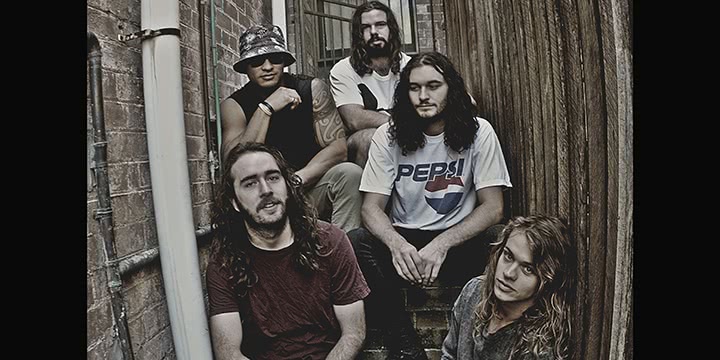Vocalist Sam Carter joined Architects in the lead-up to the band’s second album, 2007’sRuin.
Since that time, Architects have never had more than a fleeting rest. With each successive release they’ve gained more success, but rather than basking in their flowering popularity, they’ve always gone straight back to work. Released in May, All Our Gods Have Abandoned Us is the UK metalcore outfit’s seventh album.
It’s been just over two years since the release of Lost Forever // Lost Together (which charted in the Australian and UK top 20) – a long time by Architects’ lofty standards – but another record was always on the cards.
“When we’d just finished Lost Forever, we were already talking about the new record, All Our Gods, but we knew that we wanted to take a bit more time with it,” Carter says. “Especially after the first year of touring Lost Forever, we realised how well that album had been received. We just wanted to tour it as much as we could, because we hadn’t played shows where people cared that much that consistently. We just wanted to do a lot more touring and mainly focus on that record for a couple of years.”
Architects visited Australia twice during the Lost Forever touring cycle, including a support run with The Amity Affliction in 2014 and a headline stint early last year. The extended touring schedule didn’t deplete the band members’ creative energy – if anything, it solidified their intentions for All Our Gods.
“When it came down to writing, it was a really natural process,” Carter says. “We were all on the same page; it was really fun getting it together. At the same time, it was cool because we were writing in between going on tour and playing these wild shows. So we were going into the studio with confidence we hadn’t necessarily had before.”
Given the success of Lost Forever, Architects stuck with the same recording format for All Our Gods. Namely, they returned to Studio Fredman in Gothenburg to work with producers Henrik Udd and Fredrik Nordström. Udd also mixed and mastered the album, and Architects are credited as co-producers.
“There was no doubt in our minds who we were going to go with,” Carter says. “When we were in the studio last time, Henrik was like the sixth member of our band. He fully understood where we were going with it, how we were working on it. He just gave it as much effort and time as we did. For us it’s really cool to go back with him, because we all needed to step up, get a better record than Lost Forever. And he himself was like, ‘I need to step up. I’m going to get a better sounding record.’ He blew us away.
“Both of them have got such a good ear for metal,” Carter adds. “I genuinely think they’re one of the best studios in the world for that kind of music. Together I feel like we created a really great sounding album. Great people, and really dedicated – I wish more people would record with them because they’re so great.”
Carter and co. were initially attracted to the Studio Fredman team for their work on the second and third Bring Me The Horizon records, as well as releases from At The Gates and I Killed The Prom Queen. Nevertheless, when it came to All Our Gods, they didn’t look beyond the studio for references.
“It was just going off the back of Lost Forever – just being influenced by that record and things we liked on that record, sound-wise, and growing from there,” says Carter. “[We were] giving Henrik some free rein: ‘We know that you know what sounds good, and just go with it and make it sound as good as you can.’ He really went to town with it, especially with the guitars. I think the drums sound fucking crazy. I used to play drums, so I’ve got a really keen ear for it. The step up in drum sound from Lost Forever to All Our Gods is wild.”
An interesting detail of the Architects story is their fourth album, 2011’s The Here And Now. Not nearly as heavy as the records that preceded it, the album was largely shunned by their fan base. They followed up with Daybreaker in 2012, which resumed the technical metalcore sound of their earlier work, and their latest two releases are perhaps even heavier, while also incorporating ambient electronics and conspicuous melodic sections. Carter now admits that after The Here And Now it was necessaryto review the band’s identity.
“I feel like that record needed to happen,” he says. “We needed to get that out of our system. We were young then, we were growing up, we thought we knew everything, we thought we had free rein over our band and we could do what we wanted. And it’s not really the case. Once you’re in a band that’s doing well, people invest in a certain sound of a band and they love a certain sound of a band. They don’t want to hear acoustic guitars. That’s not Architects. But I’m glad we did that, because afterwards we really did figure out our true identity and what we were good at.”
All Our Gods Have Abandoned Us byArchitects is out now through Unified.

































